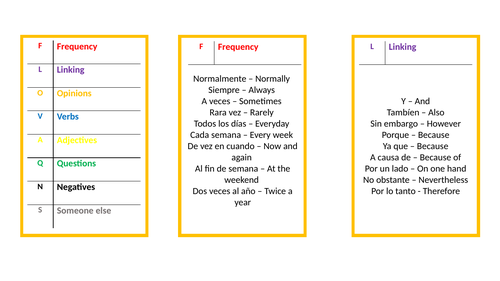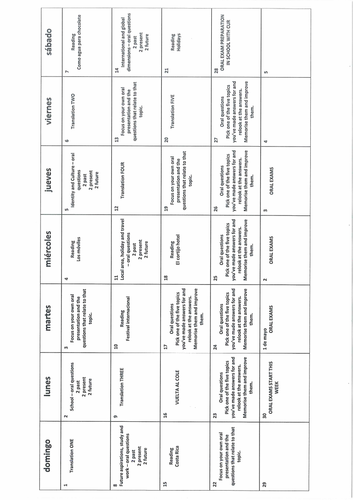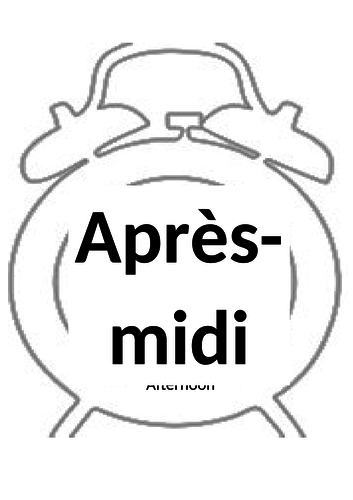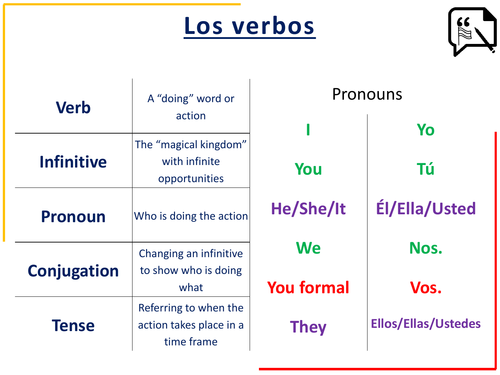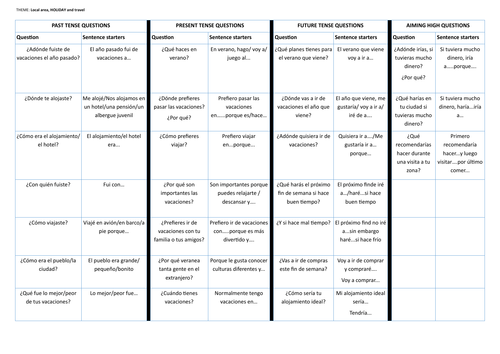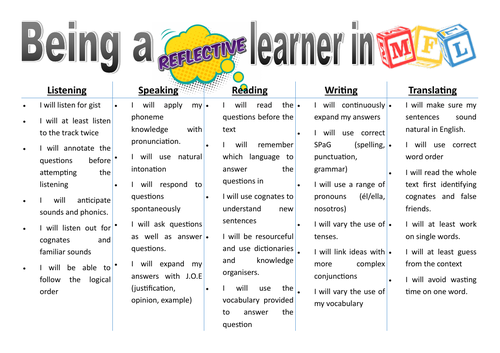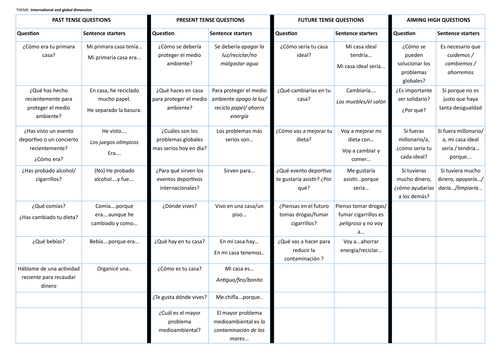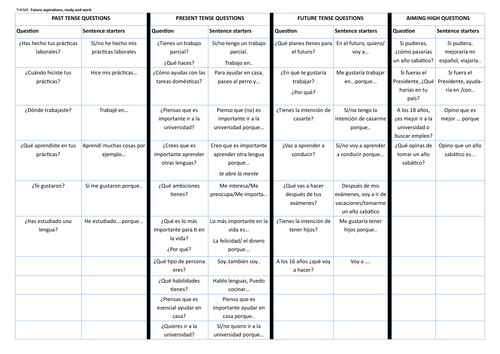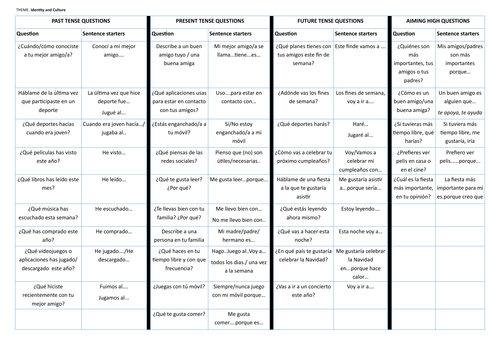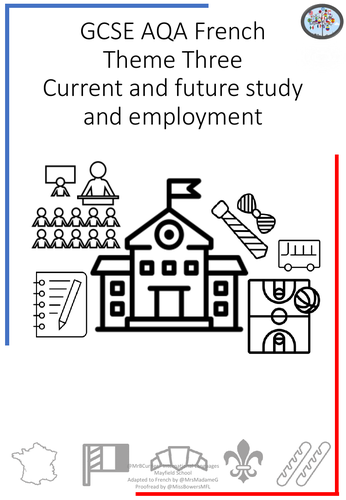
16Uploads
128k+Views
158k+Downloads
All resources

GCSE Spanish AQA Writing
I’m more than happy to share resources. If you’re happy with them, feel free pressing the coffee link if my resources have helped you.
I have to thank Anne Liese for her support to adapt the Edexcel plans to the AQA specification. Thank you so much!
Tiering
A booklet has been created for both Foundation and Higher tier as there are some elements not assessed in both exams.
Foundation booklet
In the Foundation booklet, I have reminded the pupils of the ‘I can’ statements for their four parts to their writing exam; photo card, 40 words, 90 words and five sentence translation. For each part of these, pupils have their assessment grids with WAGOLL examples and space for them to prepare their own responses. Also, I have chosen different topics for pupils to plan writing questions on.
Higher booklet
In the Higher booklet, again, I have provided the pupils with their ‘I can’ statements for their three parts; 90 words, 150 words and paragraph translation. Similarly to the Foundation booklet, pupil have their assessment grids with WAGOLL examples and space for them to prepare their own responses.
Writing planning
The acronyms P.P.OF and J.O.E are key to our writing planning and they are explained below.
P.P.O.F
Past Present Opinion and Future is one acronym all our pupils in Languages are used to as we encourage all written and spoken communication to contain the four parts. These are also the fundamental four parts that are included in the 90 and 150 words writing tasks. For each part of P.P.O.F I have provided the most essential parts to them and also given pupils a blank version for them to jot anything down to help them remember and add in their own individuality.
J.O.E
Remember to Justify your Opinion with an Example. There is always a need for pupils to elaborate their opinions and we encourage them to use J.O.E. This is very important for the 150 words writing task as pupils need to justify their ideas and opinions.

Edexcel Spanish writing exam
A PowerPoint that contains key structures to help structure pupil’s work when answering the written paper for GCSE Edexcel Spanish.
Ideas including;
P.P.O.F - Present, Past, Opinion and Future - helping to answer all four bullet points
Justifications - Using a range of expressions to justify and show more complexity
Essay planning - How best to plan the four bullet points
Phrases that will stand out - Including expressions in the past, present and future to help grade boost a piece of work.

Spanish photo frames
Providing FLOVAQNS writing structure in Spanish, star graded phrases and most importantly, target language that students can independently use in lessons.
All at the right size to fit in Tolsby frames from a very famous Swedish shop.

GCSE Spanish revision: Reading and Writing exam
GCSE Spanish revision booklet which contains literature texts, translations from English-Spanish or Spanish-English and essay planning for the writing exam.
The writing exam planning is something I have used with my classes and allows for them to think about key words and phrases that will help them answer each bullet point.

April homework - GCSE Spanish Edexcel
A plan for homework for the whole of April which includes exam questions from Edexcel, Higher and Foundation translations and space to write down key oral questions for each theme. Printed into a booklet and will be given to pupils next week for the whole of April.

Edexcel GCSE Spanish Final Writing Preparation
Edexcel GCSE Final Writing Preparation.
Presentation includes breakdown of techniques for last minute support with Foundation and Higher Spanish writing exam.

Spanish and French classroom displays
A variety of resources/displays that I created a few years ago and every year update.
Spanish and French grammar - including the conjugations for the different tenses, plus irregulars
Questions - question words in the foreign language and English
Spanish and French clocks - clocks with time expressions on
Spanish and French jigsaw pieces - connectives in each language, as well as a translation on each one
Opinions - With a variety of opinions and justifications.

French and Spanish Grammar Display
If you’re happy with these resources, you can always buy me a coffee to say thanks: https://buymeacoffee.com/MrBCurrier
These displays are on a grammar timeline in my classroom for the pupils to refer to the conjugations of regular verbs and key irregular verbs.
Infinitives are referred to as “Magical Kingdoms” as they are all ruling and this is something that has helped our pupils remember verb infinitives.
I have covered the main tenses that are needed for the GCSE and cover the subjunctive as a special tense in-class.

Edexcel Spanish GCSE - Local area, holiday and travel.
A breakdown of past, present and future tense questions for the new 9-1 GCSE topic Local area, holiday and travel. This document contains questions and suggested sentence starters to support pupils.

Reflective learner MFL
A helpsheet to encourage pupils to be reflective learners in MFL with a focus on Spanish.

GCSE Spanish: Topic planners
A breakdown of the 5 themes for the Edexcel GCSE in Spanish with key verbs, adjectives, nouns and star quality expressions. Also, there are expressions in a variety of tenses in the past, present and future.
Each column has 3 starting points and then it is up to the pupils to add what they need to revise on.

Edexcel Spanish GCSE - International and global dimension
A breakdown of past, present and future tense questions for the new 9-1 GCSE topic International and global dimension. This document contains questions and suggested sentence starters to support pupils.

EDEXCEL Spanish GCSE - Oral questions
A broken down document which has past, present, future tense and aiming high structures for the new 9-1 GCSE Spanish. Questions and suggested sentence starters to support pupils with their answers.

Edexcel Spanish GCSE - Future aspirations, study and work
A breakdown of past, present and future tense questions for the new 9-1 GCSE topic Future aspirations, study and work. This document contains questions and suggested sentence starters to support pupils.

Edexcel Spanish GCSE - Identity and Culture
A breakdown of past, present and future tense questions for the new 9-1 GCSE topic Identity and Culture. This document contains questions and suggested sentence starters to support pupils.

GCSE French Knowledge Booklets - AQA
I’m more than happy to share resources. If you’re happy with them, feel free pressing the coffee link https://www.buymeacoffee.com/MrBCurrier if my resources have helped you.
The knowledge booklet
I am pleased to say and share with the languages’ community three knowledge booklets; one for each topic and one for the grammar and tenses. Each booklet starts with all ‘I can’ statements that I feel cover all the areas under the GCSE AQA French specification. There then are four columns for the pupils to use as a RAG rating. This will hopefully help guide their revision a lot easier than before and they will be able to see the statements they may need to refer to and do some extra work about. For each statement, either half a page or a whole page has been created with essential vocabulary and structures for the pupils to refer to and know what they are expected to use. To link with dual coding, I have used Noun Project https://thenounproject.com/ to find simple images that mirror the vocabulary in-hand.

French book basics and register routine
I’m more than happy to share resources. If you’re happy with them, feel free pressing the coffee link if my resources have helped you.
The French book basics contains verbs, time frames, opinions, conjunctions, adjectives and numbers on. This is stuck in the front of each pupil’s exercise book and encourages them to be resourceful.
The register routine encourages spontaneous speech at the beginning of each lesson rather than just answering the register with “bonjour,” the pupils are provided with more structures and support how best to answer how they are feeling. This has worked really well encouraging more spontaneous speech in the speaking exam, so I use it from the very start in Year 7.



